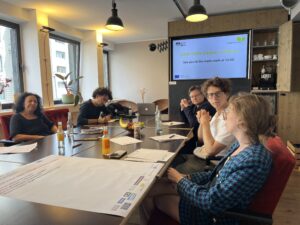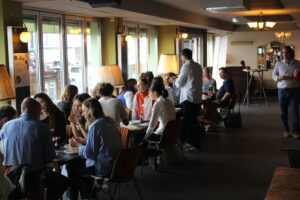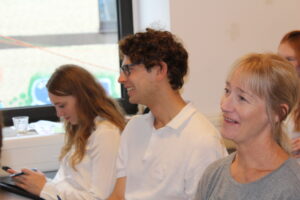On 11th September 2025, a 6-person Eumans delegation from Brussels attended the citizens’ assembly held in Cologne, Germany, including me. The assembly, called Democracy Unboxed, was planned to celebrate International Democracy Day on 15th September and was part of the European Union-funded project “Citizens’ Action for Democracy” (CitiDem). The project aims to empower citizens through participatory democracy tools and practices, with the aim of influencing European politics. Eumans and Democracy International – the host of Cologne’s Assembly – are members of a consortium involving 12 partners spanning from universities to civil society organisations.

In fact, CitiDem aims to engage European citizens with alternatives complementary to representative democracy. The assumption is that, if you only leave democracy to the ballot box, it often proves static and distant from the real needs of citizens. With this scope in mind, Democracy Unboxed had two main objectives: First, to inform citizens about their European and German participatory and deliberative tools via panels of experts. Second, to encourage participation and collective action by testing attendants – mostly coming from civil society organisations – through workshops, where they would be asked to develop direct democracy tools. It’s a bit overwhelming, isn’t it? Let’s take a step back, and see the point of view of an “every-citizen”, like me
In the morning, Democracy International welcomed us with some coffee and breakfast at die wohngemeinschaft, Richard-Wagner-Str. 39, where we had the chance to connect with other participants. Then, we gathered in the conference room, where Daniela Vancic , head of Democracy International’s European programme, and Daniel Schily, co-founder of Democracy International and founder of the German direct democracy organisation Mehr Demokratie, delivered the training session . “Signatures, Petitions and Power”, dedicated to ECIs (European Citizens’ Initiatives). In short, ECIs promote grassroots participation by European citizens to propose laws directly to the European Commission. To launch an ECI, a 7-people “committee of citizens” is needed: they must be resident in 7 different member states, and be in the voting age for the European elections. After the initiative is submitted, the Commission evaluates the registration, to ensure the scope of the initiative falls within the EU’s competence areas t. In case the ECI is accepted by the Commission, the “committee of citizens” has to collect one million signatures in at least seven member states, and to pass a specific threshold in each of them (number of elected Members of the European Parliament elected in that country multiplied by the total number of MEPs). If these requirements are met, the European Commission verifies the signatures via competent national authorities. If the verification phase is successful, the European Commission is formally compelled to convene a public hearing with the organising committee, who will then also present the initiative at the European Parliament. If the Commission deems a piece of legislation is a suitable response to the ECI, it will begin drafting an official proposal, a process that may involve preliminary steps such as public consultations and impact assessments. This could clearly lead to a deadlock in the legislative process, which could even result in the proposal being rejected. If and after the Commission adopts the proposal, it is forwarded to the European Parliament and the Council of the European Union (or, in certain cases, only to the Council), starting the so-called trilogues to translate the proposal into law.

It sounds really cool, and it is in fact, mostly when you try to elaborate a campaign on your own as we did after the first panel. Indeed, attendants were divided into several focus groups and, together with other activists from all over Europe, we were asked to develop, in a very short time, a European campaign. My focus group elaborated a participatory democracy tool to put municipalities at the very core of our campaign. We would start with small local and civic spaces, also involving schools and educational institutions, to organise assemblies and debates, provided
that the proposal was supported by at least 5% of the population. A scale-up approach could allow them to engage frim at the municipal level to the European level, exploring (but not requiring) regional, national, and cross-border implementation. Democracy International will soon publish the results of the Assembly, where you will see all focus groups’ proposals and even more
The second panel was presented by Thorsten Sterk, Campaigner for citizens’ assemblies at Mehr Demokratie, and it delved into how to shift from an elective democracy model to a deliberative democracy one, where dialogue and consensus-building matter more. Deliberation can help rebuild trust in institutions by improving the transparency of decision-making and opening it with participatory practices, such as citizens’ assemblies, participatory budgeting, deliberative polls, or online deliberation platforms. Citizens’ assemblies are composed of randomly selected groups of citizens (like a jury) respecting diversity quotas, who repeatedly meet to study an issue, deliberate, and make recommendations. This way, citizens are facilitated to provide their honest, direct input, in contrast with the vested interests often represented by traditional political actors.
As a consequence, their contribution is expected to be more reliable, as it is not influenced by conflicts of interest, and the whole process builds civic awareness and a sense of belonging to the democratic community
Well, that might look amazing, yet, one might wonder: how can ordinary citizens deliberate on technical issues? In fact, informing and educating citizens is paramount for the success of these processes. In citizens’ assemblies, experts play a crucial role: they help design the process, provide balanced information, and answer questions in case participants need further explanations. During deliberation, experts may clarify facts or assist in drafting recommendations, but their role is simply to inform and advise: citizens keep the real power, and the final word.

Back in Brussels, it was time for some final reflections and I will borrow the words of one of our Eumans activists, who was interviewed during the day and spoke about the advantages of citizens’ assemblies, but also their disadvantages, and whether, all things considered, she believes they are effective methods of direct democracy: “Talking to another person (during citizens’s assembly ed), discussing things peacefully, is very important. With smartphones, for example, we have lost this way of relating peacefully to others. This assembly also creates the feeling that, by talking to another person, you feel valued. The only thing that sometimes seems to be missing in this assembly is the presence of people who are very far removed from this democratic process. I think we should go out and find these people and create a real mix and real diversity. We must remember the EU motto: United in diversity. All in all, citizens’ assemblies are an effective method because experiences and ideas are shared and people are empowered, because this assembly creates bonds between people and is a way of being together”.

